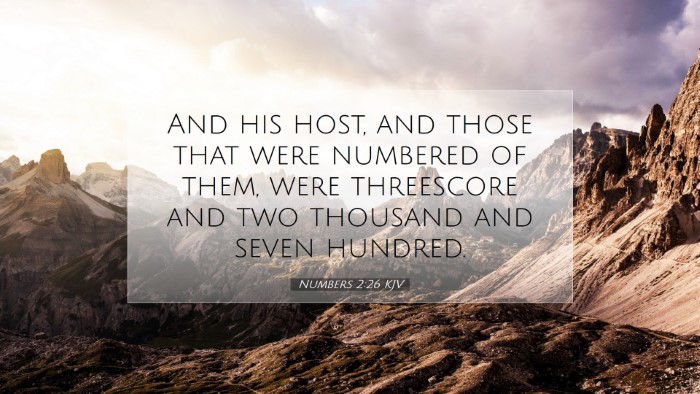Commentary on Numbers 2:26
Verse Context:
Numbers 2:26 states: "And those that pitch by him shall be the tribe of the children of Joseph: the tribe of Manasseh, and the tribe of Ephraim."
Introduction
In this verse, we observe the arrangement of the Israelite tribes as they camped around the Tabernacle. The book of Numbers provides a detailed account of the Israelites’ journey through the wilderness and the instructions given by God regarding their organization. This commentary will delve into the significance of the tribes of Joseph, namely Manasseh and Ephraim, and their placement in the camp.
Historical Background
Commentary by Matthew Henry emphasizes the importance of the genealogical structure in the Old Testament, highlighting that the tribes of Israel were named after the sons of Jacob. Joseph, an important figure, had two sons, Ephraim and Manasseh, who received a double portion in the inheritance of the land of Canaan (Genesis 48:5). This reference to Joseph in Numbers 2:26 indicates the double heritage of the tribes resulting from Joseph's favored standing among his brothers.
Significance of Ephraim and Manasseh
Albert Barnes elaborates that Ephraim and Manasseh were not merely significant because they were descendants of Joseph but also for their prominent roles during the division of land in Canaan. Ephraim would become one of the leading tribes and often represent Israel as a whole, particularly in prophetic literature. The dual designation of Manasseh and Ephraim showcases God's fulfillment of His promise to Joseph and the importance of Joseph's legacy as a leader among the tribes.
Spiritual Lessons
- Leadership and Legacy: The prominence of Joseph’s sons signifies the importance of godly leadership and the legacies one leaves behind for future generations.
- God's Faithfulness: The arrangement of the tribes demonstrates God’s faithfulness to His promises to Abraham, Isaac, and Jacob, affirming His covenant with them.
Campsite Arrangement
Adam Clarke discusses the literal arrangement of the tribes around the Tabernacle. The tribe of Judah was placed to the east, the most honored position, followed by Issachar and Zebulun. Joseph’s tribes, Ephraim and Manasseh, were strategically placed to the west, indicating a fortified and powerful presence. This arrangement was symbolic of their responsibilities as leaders, representing strength, heritage, and the prosperous future God had intended for Israel.
The Role of the Tabernacle
The Tabernacle was central to the Israelites' worship and existence in the wilderness. The placement of tribes around the Tabernacle serves to remind us that the presence of God is at the heart of the community. The tribes' formations indicate that their unity and strength are derived from their proximity to God.
Theological Implications
Numbers 2:26 carries significant theological weight. It reinforces the concept of divine order, suggesting that within God's kingdom, there is purpose, purpose that establishes identity, mission, and location accordance to divine will. The structure of the camp denotes a larger narrative of how God interacts with His people historically and relationally.
Applications for Today's Church
The lessons gleaned from Numbers 2:26 are applicable today. The arrangement invites each believer and community of faith to reflect on their relationship with God. Just as the tribes encamped in obedience to God's directive, so too should believers seek to align themselves in community and fulfill their God-given roles.
- Unity in Diversity: The coexistence of Ephraim and Manasseh illustrates that a diversity of gifts and backgrounds can unite for a divine purpose.
- Commitment to God's Presence: The positioning of the tribes reminds modern Christians of the necessity of centering their lives around God's presence and guidance.
- Emphasis on Legacy: Churches today should be inspired by the patriarchal legacies, encouraging leaders to leave a lasting positive impact on future generations.
Conclusion
The verse Numbers 2:26 is rich with historical, cultural, and spiritual significance. By analyzing the placement of the tribes of Ephraim and Manasseh, one gains insights into God’s promises, the importance of heritage, and the structure within the community of faith. For pastors, theologians, and students of Scripture, these insights offer profound lessons on leadership, unity, and the centrality of God's presence in every aspect of life.


